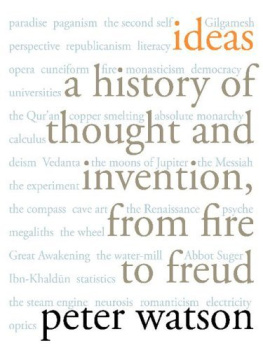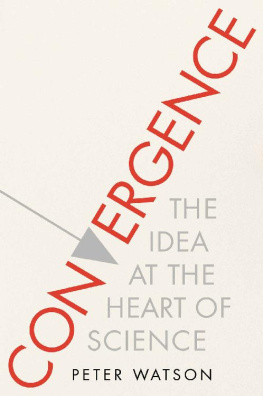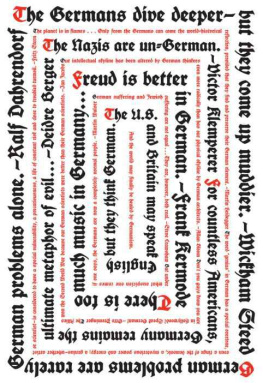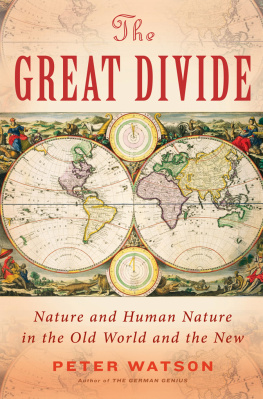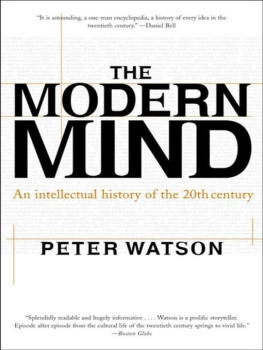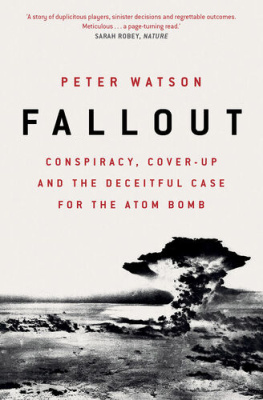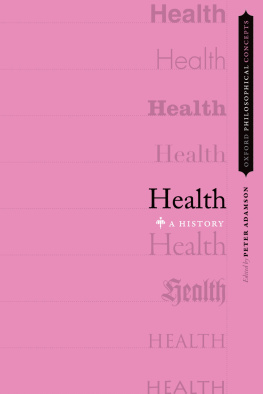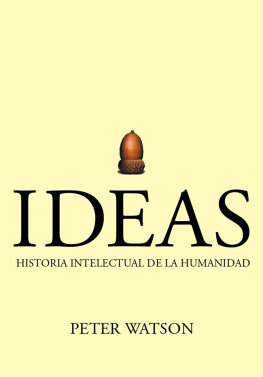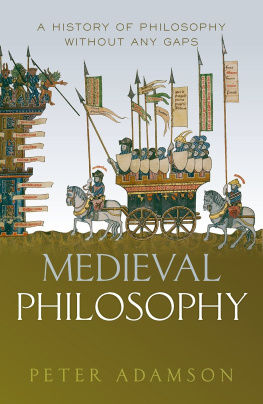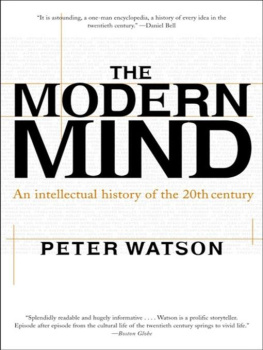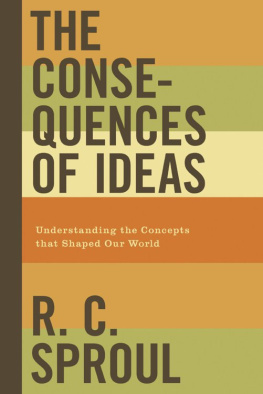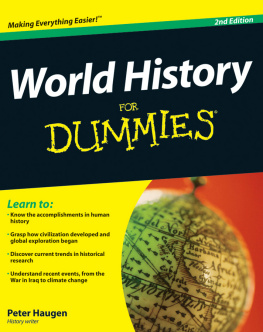
IDEAS
A History of Thought and Invention, from Fire to Freud
For Bb
There are no whole truths;
All truths are half-truths.
It is trying to treat them as
Whole truths that plays the devil .
ALFRED NORTH WHITEHEAD, DIALOGUES (1953)
While it may be hard to live with generalizations,
it is inconceivable to live without them .
PETER GAY, SCHNITZLERS CENTURY (2002)
Contents
Authors Note
Introduction: The Most Important Ideas in HistorySome Candidates
Prologue: The Discovery of Time
PART ONE: LUCY TO GILGAMESH
The Evolution of Imagination
1. Ideas Before Language
Scavengingbipedalism and meat-eatingupright posturethe oldest artefactschanges in brain size and hand-axesfireochreburialNeanderthalsthe first abstract ideaBerekhet Ramthe cultural explosioncave artVenus figurinessplit housessexual imagerytextilesbeads and ritual
2. The Emergence of Language and the Conquest of Cold
The size of early groupshunting toolstailored clothingproto-languagesSiberia to Alaska: Malta, Afontova Gora, Dyukhtai, Berelekh, Denalisinodontythe Neanderthals hyoid bonethe language geneNostratic and other mother tonguesthe first soundsthe first wordsthe first writing?
3. The Birth of the Gods, the Evolution of House and Home
Domestication of plants and animalshot spotsfounder cropsincreasing control of firecultivation of cerealsfertile crescentdrawbacks of agriculturea more arid worldpopulation crises in pre-historysedentismhealth crisis in pre-historysedentary foragingthe first housesNatufian/Khiamian culturesthe Woman and the Bull, the origin of religionfire-pitsfirst use of clayfemale figurinestransition from stone to potterymegalithsstone temples of Maltathe Great GoddessOld Europecopper smeltingbronzeirondaggers, mirrors and coinsthe intellectual impact of money
4. Cities of Wisdom
The first citiestemple citiestemple cultorigin of writingtokensVinca marks (Old European scripts)Indian scriptfirst pictographscuneiform at Shuruppakearly names and listssyllabary and then alphabetRas Shamra (Ugarit)the first schoolsthe first archives/librariesthe first literary textsGilgameshthe en and the lugal: rival leadersthe wheeldomestication of the horsehorses and warthe first law codes
PART TWO: ISAIAH TO ZHU XI
The Romance of the Soul
5. Sacrifice, Soul, Saviour: the Spiritual Breakthrough
Sexuality in agricultureself-denial as the basis of sacrificesky godsconcepts of the soulIndo-Aryans and the soul in the Rig VedaGreek ideas of the psyche and thymosthe afterlife and the underworldIslands of the Blessedparadisenapistu/nepheshthe Axial Agestone worship in the BibleYahweh becomes the dominant godthe prophets of IsraelZarathustraMithrasHinduismthe BuddhaPythagorasthe OrphicsPlatoAristotleConfuciusTaoism
6. The Origins of Science, Philosophy and the Humanities
Homerthe Odyssey and the Iliadmythhoplite infantrycoins and agricultureDraconSolon as tyrantAthenian democracythe polisPericles and the golden agethe AssemblyIonian sciencePythagoras and square numbersthe planets as wanderersatomic theoryHippocrates and Asclepius: early medicinesophistryProtagoras and Xenophanes: scepticism leads to philosophySocratesPlatoAristotletragedyAeschylus, Sophocles, EuripideshistoryHerodotus and Thucydidessculpturethe ParthenonPhidiasMyronvase paintingPraxiteles and the female nudeEastern influences on Greecethe birth of Greek individualism
7. The Ideas of Israel, the Idea of Jesus
Israel in exilethe invention of Judaismcircumcision, the Sabbath, the synagogueCyrus the Greatthe creation of the Old Testamentdoubts over Abraham, Noah and Mosesdoubts over the Exodus, Solomon and Davidpagan YahwehismGenesis: E, J and P sourcesthe SeptuagintApocryphaGreek and Hebrew literature comparedSadducees, Pharisees, Zealots and Essenesthe idea of the MessiahHerodthe idea of Jesusdiscrepancies in the gospelspagan ideas of virgin birththe role of Galileethe Crucifixionthe ResurrectionJesus never intended to create a new religionPaul and Mark
8. Alexandria, Occident and Orient in the Year 0
Time in the ancient worldBabylonian astronomyreconciling lunar time and solar timeshabbatumGreek aion or sacred timeclepsydras in RomeLatin months and Roman timeAlexandria as a centre of calculationits great libraryErotosthenesEuclidApolloniusArchimedesPtolemyOrphic mysteriesPlatonism and ChristianityClementPhiloNeoplatonismempiricismtime in IndiaBuddhism and ChristianityJudas Thomas in Indiathe Maurya eraChandraguptathe Rock EdictsAshokaMahabharata and Ramayanarock-cut templesyogaThe Lotus of the Good LawBuddhism in Chinatime in ChinaImperial Confucianismcorrespondence and resonancethe imperial academy and the five classicsMahayana/Hinayana BuddhismAsvaghosaparadise/Amitabhaostentatious generositythe water-millthe wheelbarrowthe rudderthe invention of paper
9. Law, Latin, Literacy and the Liberal Arts
Utilitas and power in ancient Romerepublicanismmagistracy replaces kingshipimperiumthe Senatelaw and the Twelve Tablesiudicesstatus, dignitas and patria potestaspaterfamiliasmanustypes of Roman marriageeducation and the core curriculumLatin, its history and effectsthe golden and silver ages of Latinrhetoricliteracypublic librariespapyrus, parchment and early techniques of scholarshipepitomes and compendiascrolls and codicesCicero and humanitasVirgilGalenconcretethe idea of the classics
10. Pagans and Christians, Mediterranean and Germanic Traditions
Decline of the Roman empireChristians in Romeproblems with the gospel of St MarkPaulJewish Christianitypaganism in Romeearly Christian martyrsConstantineobservation of Sundaypagan/Christian synthesisgift of the spiritthe idea of bishopthe rise of Romemonasticismpredecessors of the BiblePauls epistlesClement of AlexandriaJeromeAugustineGregory the Greatthe Easter controversy BC / AD barbaros, early ideas of barbariansthe idea of the Middle AgesCeltic and Germanic tribesbarbarian godsthe Hunsthe division between Latin and Germanic peoples
11. The Near-Death of the Book, the Birth of Christian Art
The effects of barbarian depredationsChristians reject scienceChristian view of rhetoricthe closing of the Western mindsuspicion of booksatrophy of debateRomes libraries closedJustinian closes the philosophical school in AthensAlexandria isolateddecline of translationpreservation of the classics in ByzantiumThemistiusthe transmittersMartianus CapellaBoethiusCassiodorusIsidorepaper in the Westa new script: cursive minisculethe Stoudios monasterybeginnings of punctuationimperial university revived in ConstantinoplePhotius and his list of lost booksthe birth of Christian artthe first churchescatacombs of RomeDura-EuroposRavennaiconsthe iconoclast controversynew rules for Christian art
12. Falsafah and al-Jabr in Baghdad and Toledo
Pre-eminence of poetrythe Golden Odesthe time of ignoranceMecca and the tribe of QurayshMuhammadthe Night of Powerthe Quranfive pillars of Islamorigins of Arabicthe caliphateShias and SunnishadithIslamic aestheticsDome of the Rockal-MansurBaghdadGondeshapural-Mamunal-FarabiHouse of Wisdomthe great translatorshospitals and madrasasthe first pharmacyearly doctors: al-Razi and Ibn Sinaal-Khwarizmi and Hindu-Arabic numeralsal-Jabrearly chemistryfalsafahal-KindiNizamiyahMutazilitesal-Ghazalithe foreign sciences v. the Quranic sciencesCordova and ToledoAli ibn-HazmIbn Khaldunadvances in botanyibn Rushd-Averrosthe Toledo school of translatorsGundisalvi and Gerard of Cremonathe Almagest
Next page
